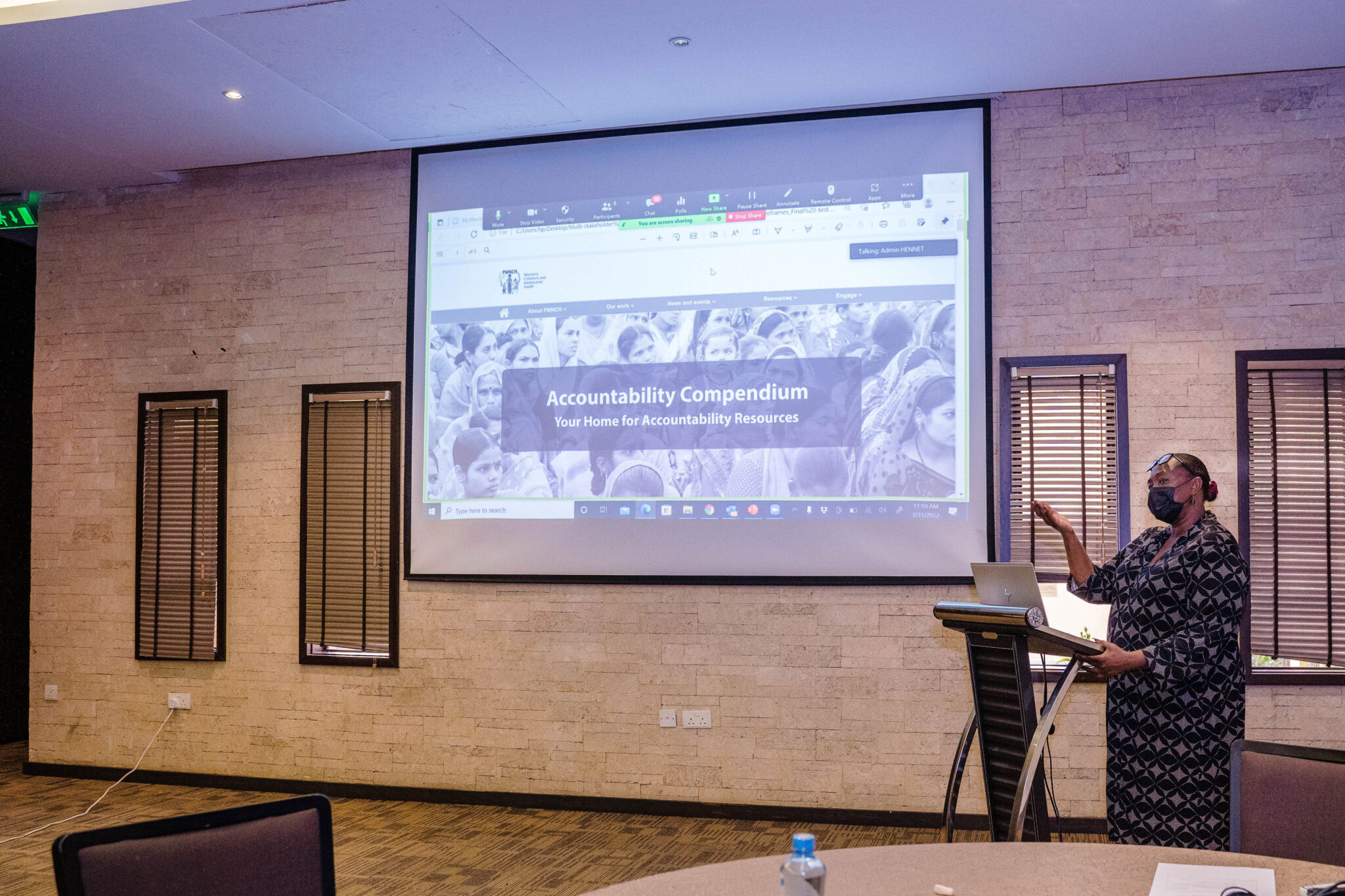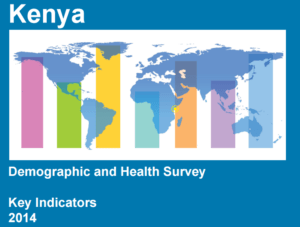The PMNCH Accountability Compendium.

Background
HENNET, a coalition of health non-government organizations (NGOs) and civil society organizations (CSOs) was set up in 2005 to bring together like-minded organizations within the health sector, whose core mandate is to strengthen the quality delivery of health services through improved health care systems in Kenya. HENNET was founded as a result of a felt need to set up a forum for CSOs dealing with health issues for purposes of collaboration, sharing of experiences and advocacy. HENNET brings together different health oriented CSOs, with diverse interests, but all having a common vision of “The trusted partner for a Healthy Kenya”. HENNET is governed by a Board of Directors (BOD) with an executive committee as defined by the network’s constitution. The board monitors and evaluates functions of HENNET based on its objectives as spelt out in the strategic plan. While the organizational and managerial support needed for implementing the network’s strategic plan rests with the HENNET Secretariat, the operational base of the network is supported by its affiliate member Non-Governmental (NGOs) and faith-based organizations (FBOs), who work in various parts of the country focusing on the many health issues that affect the country. As a network, HENNET promotes civil society’s roles and engagements to transform Kenya’s health sector. Core values that guide HENNET’s work include diversity, integrity, transparency and accountability, innovation, solidarity, sustainability, and resilience. HENNET plays a strategic position in mobilizing health CSOs to contribute to the Ministry of Health Kenya’s (MOH) policy and strategy development through different forums. In other forums such as the Council of Governors, and the Kenya RMNCAH+N Country Multistakeholder Platform, HENNET also holds a critical decision-making position since it presents voices from different CSO members across the country.
PMNCH is the largest global multi-stakeholder partnership focusing on WCAH and on the entire continuum of care. As of 2020, PMNCH has more than 1,200 partners, organized into 10 constituencies across 192 countries; no other partnership has such breadth, diversity, and penetration. PMNCH has the power to convene at the highest level and to act with pace and urgency through a global network of partners (at country, regional and global levels), hosted by WHO but with independent governance and with the richness and breadth of its large and diverse membership. The Accountability Compendium will integrate with PMNCH’s new digital platform. This integration will allow for linkages with other digital tools and resources showcased by PMNCH, including those being developed for the COVID-19 response. Accountability is also critical in the Call to Action on COVID-19. The Accountability Compendium will serve as a digital space where partners can access existing tools and resources that have been curated and vetted for ease of use, as well as provide guidance on how accountability can be used to make advocacy messaging more powerful and meaningful. It provides a platform that allows organizations to align objectives, strategies, and resources, and to advocate for and deliver interventions to improve maternal, newborn, child, and adolescent health and well-being. This unique partnership stimulates, coordinates, and resources action for the world’s most disadvantaged and disenfranchised communities. PMNCH’s new Strategic Plan 2021-2025 continues to focus on the health of women children and adolescents with three overarching objectives:
- Maternal, newborn and child health;
- Sexual and reproductive health and rights; and
- Adolescent health and wellbeing.
Its primary focus is on advocacy supported by knowledge synthesis, partner engagement, and campaigns and outreach, with accountability cutting across all the sub-functions.
Accountability is at the forefront of PMNCH’s work, with a focus on
- Reporting on progress regarding the Global Strategy for Women’s, Children’s, and Adolescents’ Health 2016-2030;
- Synthesizing evidence and sharing information on accountability resources, tools and mechanisms and strengthening partner capacity in driving accountability; and
- Supporting partners and platforms to strengthen accountability mechanisms (e.g. multi-stakeholder platforms in countries; small grants to civil society organizations (CSO), social accountability processes).
Decision-maker, power holders and service providers, in maternal, newborn, child health are increasingly and continuously being monitored and performance measured by different stakeholder including CSO, donors and beneficiaries of MNCH services in different processes and using different tools. By 2015, performance was measured through the MDGs (Millennium Development Goals) and thereafter through the SDG (Sustainable Development Goals) 3 specifically 3.1 and 3.2. Overtime as accountability becomes a key area of interest to achieve positive indicators in MNCH, tools and frameworks have been developed to support advocacy. However, these tools are hosted in different platforms by different organizations making it difficult to access useful information when conducting advocacy. This therefore has necessitated the need to develop a common platform that will house all MNCH materials to support result-based MNCH programing.
The Accountability Compendium
In light of the core function on advocacy, PMNCH will make accountability resources and toolkits available, including publications on the topic, data visualization tools, and case studies to strengthen partners’ capacity for accountability and advocacy for change. Central to this; is the role of social accountability as a mechanism through which to hold decision-makers accountable in a bottom-up approach. Given the above, the plan is now to develop a digital accountability compendium on the PMNCH website that will provide accountability resources and that can also become a space where partners can access and co-create resources and tools, as well as participate in online communities of practice.
Objectives of the PMNCH Accountability Compendium
- To provide partners with existing accountability resources (performance / professional accountability, financial accountability, social and political accountability) such as
- Accountability guidance materials and toolkits
- Data visualization tools o Case/country studies
- Latest evidence/publications on accountability
- To better explain how the accountability process is interlinked with other related processes within PMNCH and beyond (such as knowledge synthesis, country alignment efforts, and advocacy toolkits and plans, including the COVID-19 Call for Action commitments)
- To showcase resources, information, and content created (and co-created) by partners after being vetted for quality
- To provide a platform upon which to build on and strengthen a community of practice
HENNET, having successfully engaged with PMNCH in previous interventions, received funding to facilitate this process in Kenya in March 2022. This phase was to determine whether the platform; enables stakeholders to easily access accountability resources related to women’s, children’s and adolescents’ health; helps to increase understanding of accountability frameworks, and how to use resources, strengthen accountability mechanisms; provides linkages and help to translate the application of resources and best practices to specific contexts; and enables stakeholders to share good practices for peer learning, capacity building and innovation.
Objective of the Feedback Collection Process was to gain perspectives on the draft Accountability compendium to serve as an effective practical tool to support and strengthen accountability processes and mechanisms for powerful advocacy for delivering on promises made and to demonstrate progress for women’s, children’s, and adolescents’ health in Kenya and globally.
Phase one of the pilot testing in Kenya was conducted by Health NGOs Network (HENNET), with funding from Partnerships from Maternal Children Adolescent Health (PMNCH). This phase involved the collection of feedback and views on the PMNCH Accountability Compendium from different stakeholders in maternal, newborn, children, and adolescent health (MNCH).



